It can be affirmed that the success of ASEAN in the 10 years of implementing the Community and the 2025 Vision has had significant contributions from Vietnam, reflected in most of ASEAN's cooperation activities.

Vietnam became the seventh official member of the Association of Southeast Asian Nations (ASEAN) on the afternoon of July 28, 1995.
10 years of building a united and united ASEAN Community
ASEAN was established on August 8, 1967, currently includes 10 member countries: Indonesia, Thailand, Philippines, Singapore, Malaysia, Brunei, Vietnam, Laos, Myanmar and Cambodia (Timor-Leste is on the way to be officially admitted as a member).
After nearly 6 decades of formation and development, ASEAN has affirmed itself as a successful model of regional cooperation and connectivity, with an increasingly high role and prestige. ASEAN promotes comprehensive and in-depth intra-bloc cooperation, expands and strengthens relations with many partners in the world , successfully initiates and plays a leading role in many regional cooperation mechanisms.
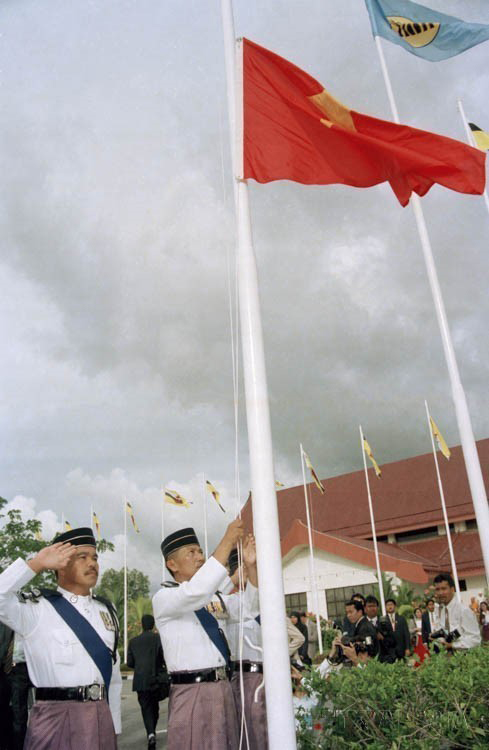
Flag-raising ceremony at the ceremony to officially admit Vietnam as the 7th member of the Association of Southeast Asian Nations (ASEAN), on the afternoon of July 28, 1995, in the capital Bandar Seri Begawan (Brunei). Photo: Tran Son/VNA
In particular, the formation of the ASEAN Community (officially on December 31, 2015) with three pillars of Politics-Security, Economy, and Culture-Society has marked a qualitative development step, turning ASEAN into a strong and cohesive political-economic entity for peace, stability, cooperation and development in Southeast Asia and the Asia- Pacific region.
The overall goal of the ASEAN Community is to build ASEAN into a politically cohesive, economically integrated, socially responsible, and outward-looking Community; operating in accordance with the rules and oriented towards the people.
The ASEAN Political-Security Community (APSC) aims to create a peaceful and secure environment in the region by raising ASEAN political-security cooperation to a new level, with three main characteristics: operating according to the law with common values and standards; cohesion, peace and self-reliance, with shared responsibility to ensure comprehensive security; and a dynamic region with open relations with the outside world.
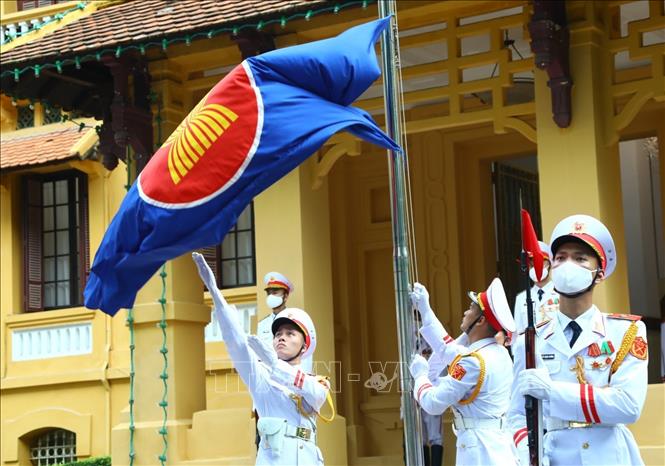
ASEAN flag-raising ceremony to celebrate the 55th anniversary of the founding of the Association of Southeast Asian Nations (August 8, 1967 - August 8, 2022) and the 27th anniversary of Vietnam's accession to ASEAN (July 28, 1995 - July 28, 2022) at the Ministry of Foreign Affairs headquarters on the morning of August 8, 2022. Photo: Van Diep/VNA
The ASEAN Economic Community (AEC) aims to create a single market and production base with free movement of goods, services, investment, capital and skilled labor; high competitiveness; equitable development; and full integration into the global economy.
The Socio-Cultural Community (ASCC) aims to serve and improve the quality of life of people, promote equality and social justice, protect the environment and sustainable development, and strengthen community awareness and common identity.
In addition, ASEAN also aims to deepen relations with partners and maintain a central role in the region through many frameworks (ASEAN+1, ASEAN+3, EAS, ARF and ADMM+); and is integrated into the activities of each pillar of the ASEAN Community...
After a decade of formation, facing a world situation with unpredictable fluctuations, opportunities and challenges intertwined, ASEAN has maintained its momentum in building the Community, maintaining solidarity and unity, continuing to develop dynamically and integrate more deeply into the global economy, affirming its central role in the region.
Regarding the ASEAN Political-Security Pillar (APSC), the implementation rate of the ASEAN Political-Security Master Plan 2025 has reached 99.6%. Political-security cooperation has been promoted extensively and comprehensively across all diplomatic, defense, security and judicial channels, affirming ASEAN's important role and contribution to peace, security and stability in the region.
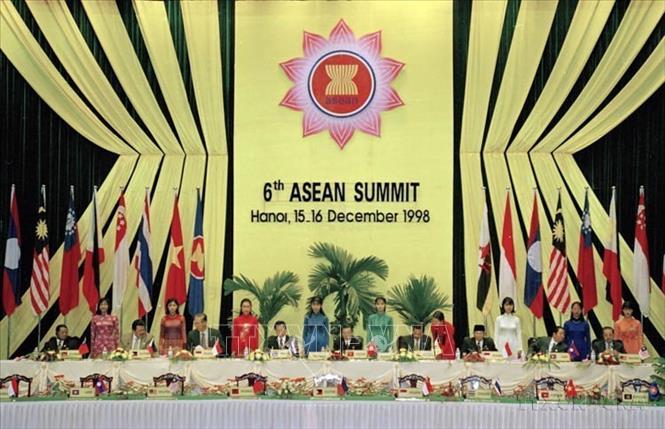
In December 1998, Vietnam successfully organized the 6th ASEAN Summit, adopting the Hanoi Action Plan, making an important contribution to strengthening solidarity, promoting cooperation, and orienting the development and cooperation of the Association. In photo: Prime Minister Phan Van Khai and heads of delegations signed the Hanoi Declaration at the 6th ASEAN Summit, which took place in Hanoi on December 15-16, 1998. Photo: Minh Dien/VNA
Regarding the Economic Pillar (AEC), the ASEAN Economic Community has made positive progress in recent years, with the implementation rate of the ASEAN Economic Pillar Blueprint reaching 93%. With a forecast growth rate of 4.7% in 2025, far exceeding the world average, ASEAN economic cooperation continues to be a bright spot. ASEAN is currently the 5th largest economy in the world with a GDP of about 3,300 billion USD and a market of 680 million people, and is expected to rise to 4th by 2030.
Regarding the Socio-Cultural Pillar (ASCC), ASEAN continues to implement the ASEAN Socio-Cultural Community (ASCC) Blueprint 2025 with a 99% achievement rate; prioritizing efforts to respond to global issues and support vulnerable groups. Many initiatives such as the ASEAN Village Network, the ASEAN One Health Network and the ASEAN Centre on Climate Change have been established.
Since 2023, ASEAN has been working towards building the ASEAN Community Vision after 2025. After the building process, recently at the 46th ASEAN Summit and related Summits held in Kuala Lumpur (Malaysia) in May 2025, ASEAN leaders officially approved the Community Vision to 2045, along with strategic plans built on 4 pillars: Politics-Security, Economy, Culture-Society and Connectivity. These are not only pillars to strengthen the internal structure but also help ASEAN go further in positioning itself as the growth center of the region.
The ASEAN Community Vision 2045 is not only symbolic but also demonstrates the highest political commitment of member states to building a strong, resilient, innovative and people-centered ASEAN Community. ASEAN Secretary-General Kao Kim Hourn commented: “The ASEAN Community Vision 2045 is a long-term development strategy, guiding the next 20-year period 2025-2045. This vision is not only symbolic but also demonstrates the highest political commitment of member states to building a strong, resilient, innovative and people-centered ASEAN Community.”
Vietnam actively contributes to building the ASEAN Community
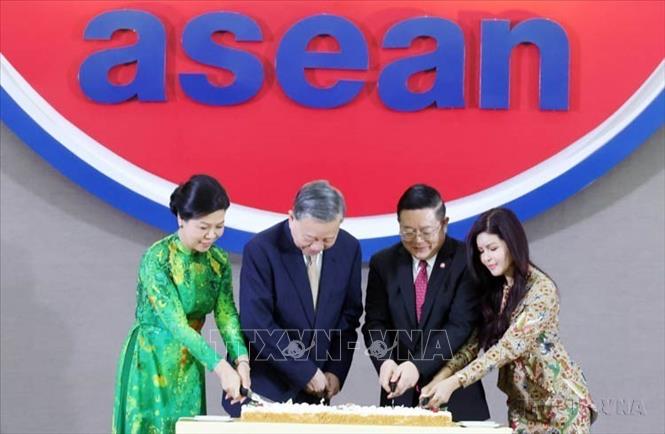
General Secretary To Lam and his wife, along with ASEAN Secretary General Kao Kim Hourn and his wife, cut the cake to celebrate the 30th anniversary of Vietnam's accession to ASEAN (Indonesia, March 10, 2025). Photo: Thong Nhat/VNA
Vietnam officially joined the Association of Southeast Asian Nations (ASEAN) on July 28, 1995. Since joining the "common house" until now, as a member, as well as when taking on important responsibilities of the Association, Vietnam has always affirmed its core role, leading and making a strong mark of contribution to the development of ASEAN.
In a proactive, positive and responsible spirit, Vietnam stands side by side with member countries to make practical contributions to the efforts to build a strong ASEAN Community, maintain solidarity and unity and promote the central role of the Association, for peace, stability, cooperation and development of the region.
Since the formation of the ASEAN Community at the end of 2015, Vietnam has been actively working with ASEAN members to build the Community, seriously implementing commitments and proposing initiatives in many fields.
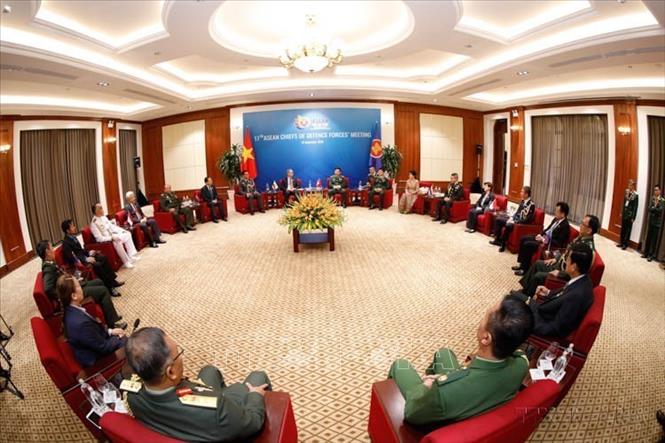
The 17th ASEAN Chiefs of Defence Forces Meeting (ACDFM-17) took place in Hanoi (September 24, 2020). Photo: Duong Giang/VNA
ASEAN Secretary General Kao Kim Hourn assessed that Vietnam has contributed greatly to promoting and maintaining peace, stability and security in ASEAN, promoting the expansion and development of ASEAN's prosperity, strengthening the bloc's external relations, especially cooperation with external partners. Vietnam is currently an important piece in politics, diplomacy, security, economy, culture and society, thereby helping ASEAN become stronger, more self-reliant and more dynamic.
Mr. Tran Ba Phuc - Member of the Central Committee of the Vietnam Fatherland Front, Chairman of the Vietnam Business Association in Australia, Vice Chairman of the Vietnam Business Association abroad, commented that Vietnam has made many outstanding contributions in key areas such as politics-security, economy, culture-society; has always been one of the countries actively promoting intra-bloc solidarity to contribute to maintaining order, peace and stability of ASEAN.
On the Political-Security pillar, Vietnam stands out as one of the countries that steadfastly defends ASEAN’s central role in the Indo-Pacific regional structure. Through a balanced diplomatic policy and flexible approach, Vietnam contributes to maintaining regional stability in the context of increasingly fierce competition for influence among major powers.
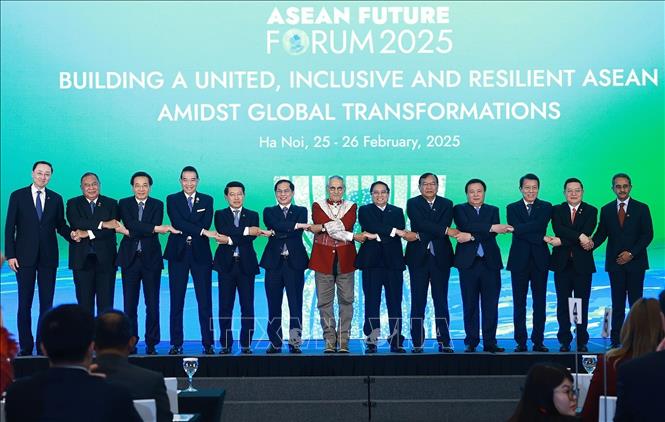
Prime Minister Pham Minh Chinh and heads of delegations attending the ASEAN Future Forum 2025. Photo: Duong Giang/VNA
Vietnam actively promotes a rules-based order, clearly demonstrating its role in building a common stance on maritime security. This is a testament to its efforts to uphold international law and resolve disputes by peaceful means. Vietnam always actively contributes to maintaining order and peace based on international conventions and laws, promoting new cooperation contents such as digital transformation, green and sustainable development.
As ASEAN Chair in 2020, at the height of COVID-19, Vietnam demonstrated its capacity to effectively coordinate health security crises and continued to contribute to responding to cross-border challenges such as crime and cyber security.
In particular, during its term as ASEAN Chair in 2020, Vietnam has quickly and flexibly promoted ASEAN's effective approach to the outbreak of the COVID-19 pandemic, proposing many important initiatives such as the ASEAN COVID-19 Response Fund, the ASEAN Emergency Medical Supplies Reserve, the ASEAN Strategic Framework for Emergencies, the ASEAN Comprehensive Recovery Framework and Implementation Plan, the ASEAN Declaration on the ASEAN Travel Corridor Agreement Framework, the ASEAN Centre for Public Health Emergencies and Emerging Diseases (AC-PHEED), etc.
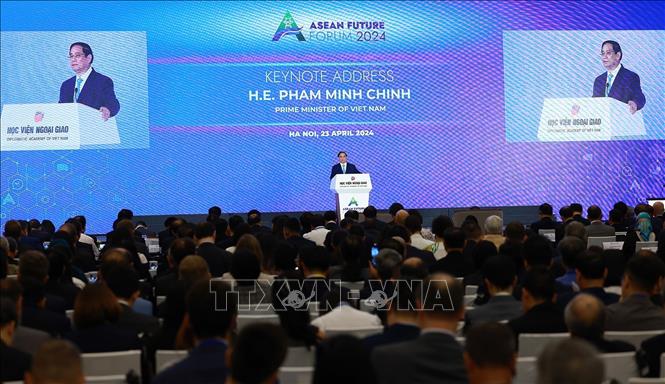
Prime Minister Pham Minh Chinh speaks at the ASEAN Future Forum 2024. Photo: Duong Giang/VNA
On the Economic pillar, Vietnam has always been strongly committed to the regional integration process, supporting trade liberalization, actively promoting the implementation of the Regional Comprehensive Economic Partnership (RCEP) and the ASEAN Economic Recovery Framework. In the field of digital economy and micro, small and medium enterprises (MSMEs), Vietnam is one of the leading countries supporting the ASEAN Digital Economy Framework Agreement (DEFA), while also mobilizing regional support to enhance capacity and adaptability for businesses.
Regarding sustainable development, Vietnam actively participates in ASEAN energy cooperation and promotes a green investment framework, in line with the emerging ASEAN Green Deal orientation.
According to Mr. Tran Ba Phuc, Vietnam has made good use of the opportunities when joining ASEAN, expanding export markets and attracting foreign investment, especially from member countries. Through the ASEAN Economic Community (AEC), Vietnam has reformed institutions and procedures to improve competitiveness, integration and strengthen cooperation in regional economic development; at the same time, proactively participating in regional connectivity initiatives such as the East-West Economic Corridor and the North-South Corridor, contributing to promoting ASEAN's economic development. Vietnam has also become an important "link" in the regional supply chain, actively promoting economic agreements such as the Regional Comprehensive Economic Partnership (RCEP) and the Comprehensive and Progressive Agreement for Trans-Pacific Partnership (CPTPP).
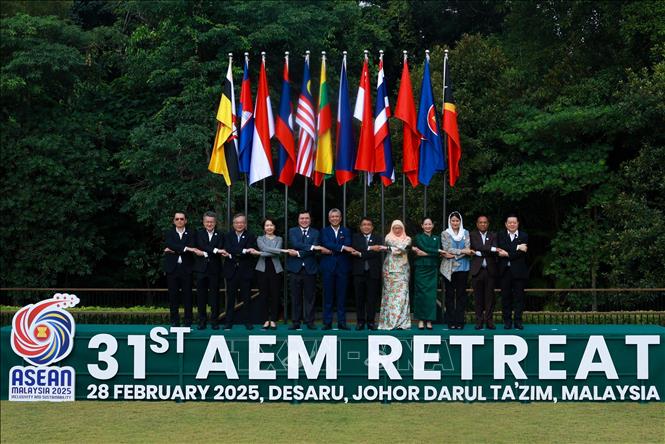
Delegates attending the 31st ASEAN Economic Ministers' Retreat (AEMR-31) pose for a commemorative photo on February 28, 2025. Photo: Thanh Trung/VNA
Meanwhile, Ms. Dinna Prapto Raharja, a research expert at the Synergy Policy Research Institute of Indonesia, commented that in terms of economic cooperation, Vietnam has contributed to the fourfold increase in intra-bloc trade over the past 30 years. Vietnam has benefited greatly from improved trade with other member countries. In turn, countries in the region, including Indonesia, have also benefited from Vietnam's presence in ASEAN.
In the field of Culture and Society, Vietnam regularly participates in cultural exchange programs, while actively promoting sustainable development and environmental protection.
Vietnam has promoted intra-bloc cooperation in technical and vocational training (TVET) and youth exchange. Vietnam actively participates in initiatives such as ASEAN Integration and Mekong Sub-region Cooperation, contributing to narrowing the development gap between member countries. Regarding identity, culture and people-to-people diplomacy, Vietnam has continuously promoted awareness of ASEAN, honored cultural diversity and strengthened social cohesion through education, language, etc.
Malaysian Ambassador to Vietnam Dato' Tan Yang Thai assessed that in building the Cultural-Social pillar, Vietnam has actively participated in and led many educational cooperation programs, youth exchanges and sports, such as hosting the ASEAN Student Sports Festival. Vietnam also pays special attention to programs to support people such as natural disaster prevention and control, health security, and labor migration, in addition to priorities on gender equality and rural development.
It can be affirmed that after 30 years of joining ASEAN, Vietnam has transformed itself from a new member into a country with a constructive and responsible voice and promoting consensus within the bloc. Its diplomatic position has been increasingly consolidated, demonstrating a strong commitment to peace, prosperity and a common identity - in line with the spirit of the ASEAN Community Vision 2045.

2025 is an important year for ASEAN and Vietnam, when the bloc officially completes 10 years of implementing plans to build the ASEAN Community and enters a new development stage with the ASEAN Community Vision 2045 with 4 implementation strategies on Politics-Security, Economy, Culture-Society, and Connectivity. In the meaningful transformation period of ASEAN, Vietnam continues to affirm its strategic position and leading role in many aspects of ASEAN's activities, making substantial contributions to the process of building the ASEAN Community Vision 2045, with the orientation towards a self-reliant, dynamic, creative and people-centered ASEAN Community. As affirmed by General Secretary To Lam in his speech at the 30th Anniversary of Vietnam's accession to ASEAN in Indonesia in March 2025, since the beginning of opening up and integration, Vietnam has always identified ASEAN as a multilateral cooperation mechanism that is directly linked and of primary importance. ASEAN is an important pillar in Vietnam’s foreign policy and an inseparable part of Vietnam’s development and integration strategy. Vietnam will continue to join hands with ASEAN countries to realize ASEAN’s historic mission and spread ASEAN’s success stories.
Phuoc An (Vietnam News Agency)
Source: https://baotintuc.vn/chinh-tri/xay-dung-cong-dong-asean-doan-ket-thong-nhat-va-dau-an-viet-nam-20250728063709087.htm


![[Photo] The "scars" of Da Nang's mountains and forests after storms and floods](https://vphoto.vietnam.vn/thumb/1200x675/vietnam/resource/IMAGE/2025/11/13/1762996564834_sl8-jpg.webp)

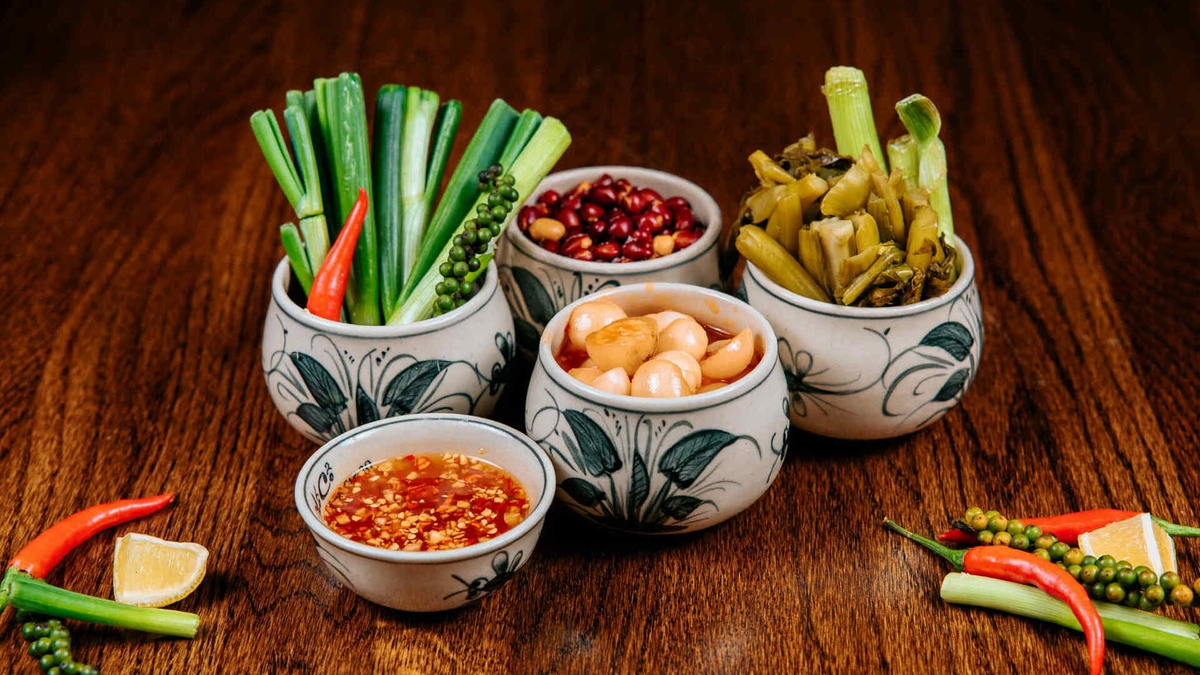

![[Photo] Prime Minister Pham Minh Chinh attends a conference to review one year of deploying forces to participate in protecting security and order at the grassroots level.](https://vphoto.vietnam.vn/thumb/1200x675/vietnam/resource/IMAGE/2025/11/12/1762957553775_dsc-2379-jpg.webp)
![[Photo] Highways passing through Dong Nai](https://vphoto.vietnam.vn/thumb/1200x675/vietnam/resource/IMAGE/2025/11/12/1762940149627_ndo_br_1-resize-5756-jpg.webp)
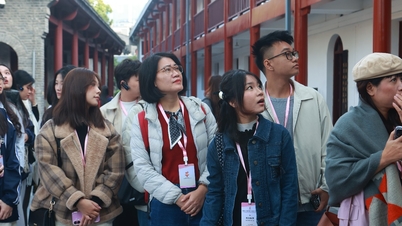
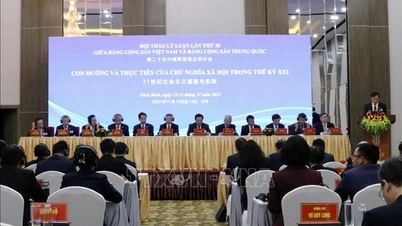



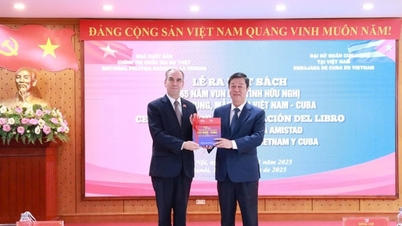

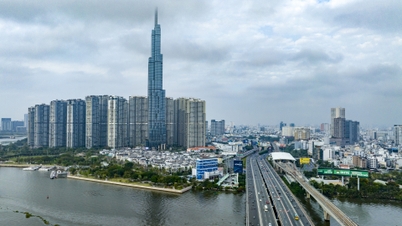

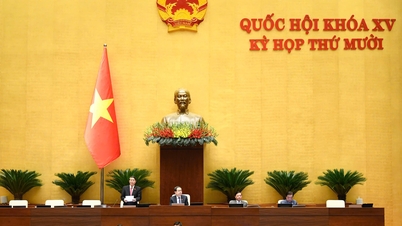

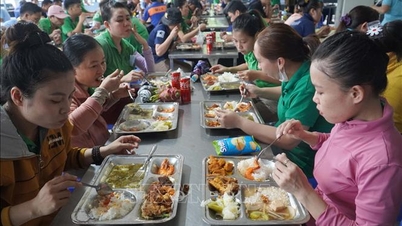
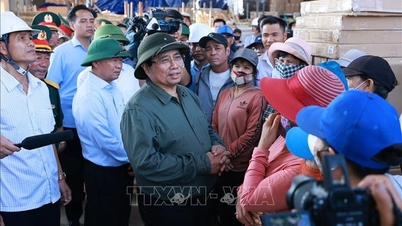










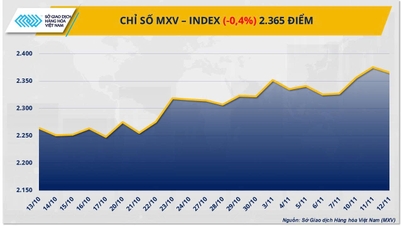
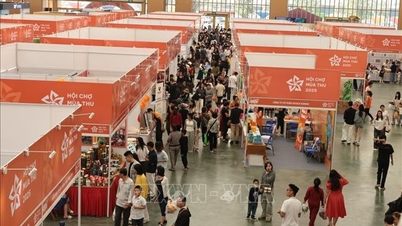


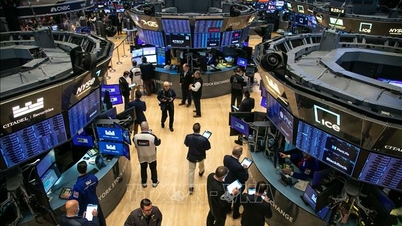





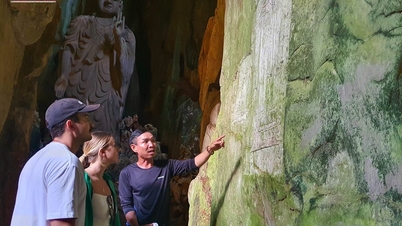
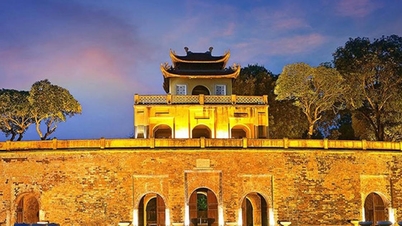





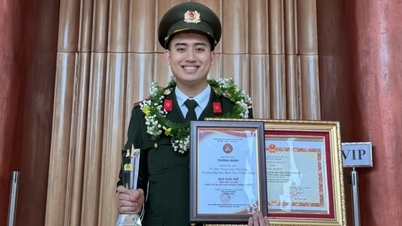
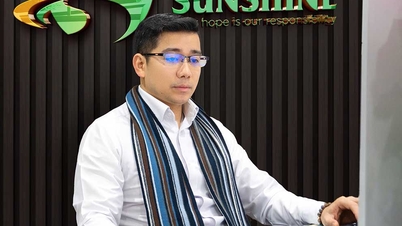

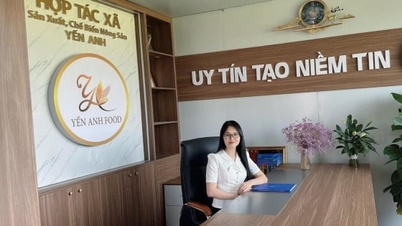
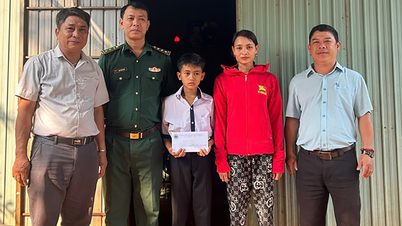






















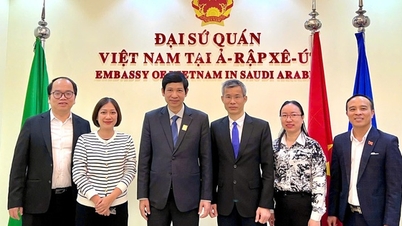

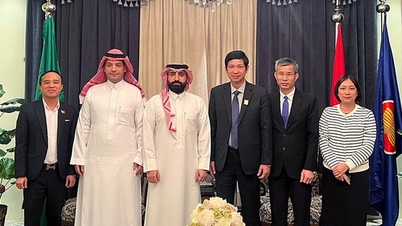
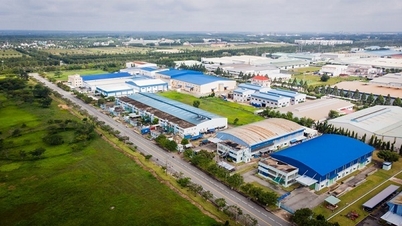

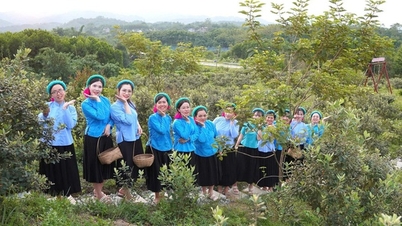
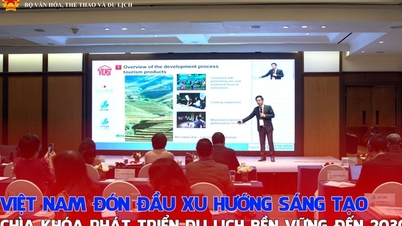




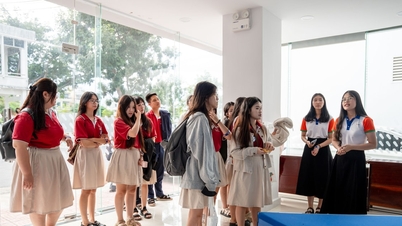




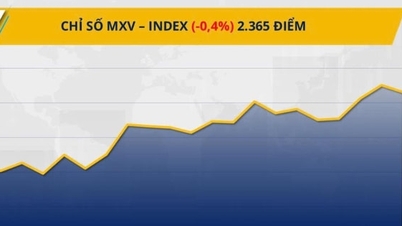
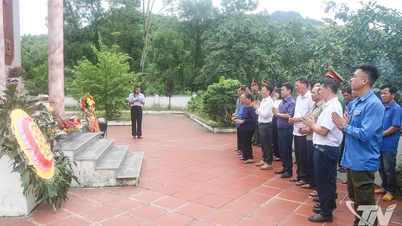





![Dong Nai OCOP transition: [Article 3] Linking tourism with OCOP product consumption](https://vphoto.vietnam.vn/thumb/402x226/vietnam/resource/IMAGE/2025/11/10/1762739199309_1324-2740-7_n-162543_981.jpeg)






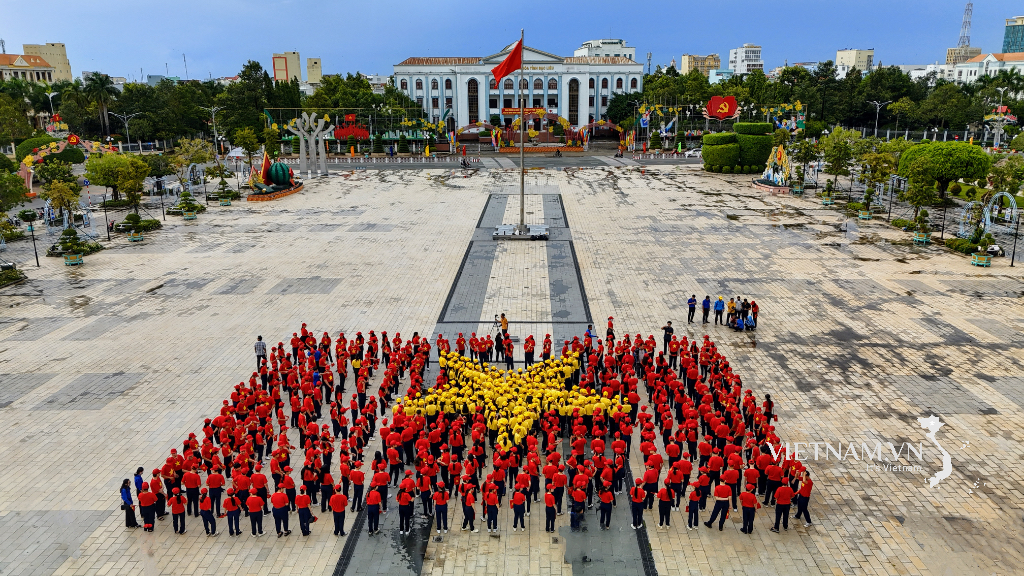

Comment (0)